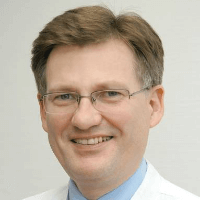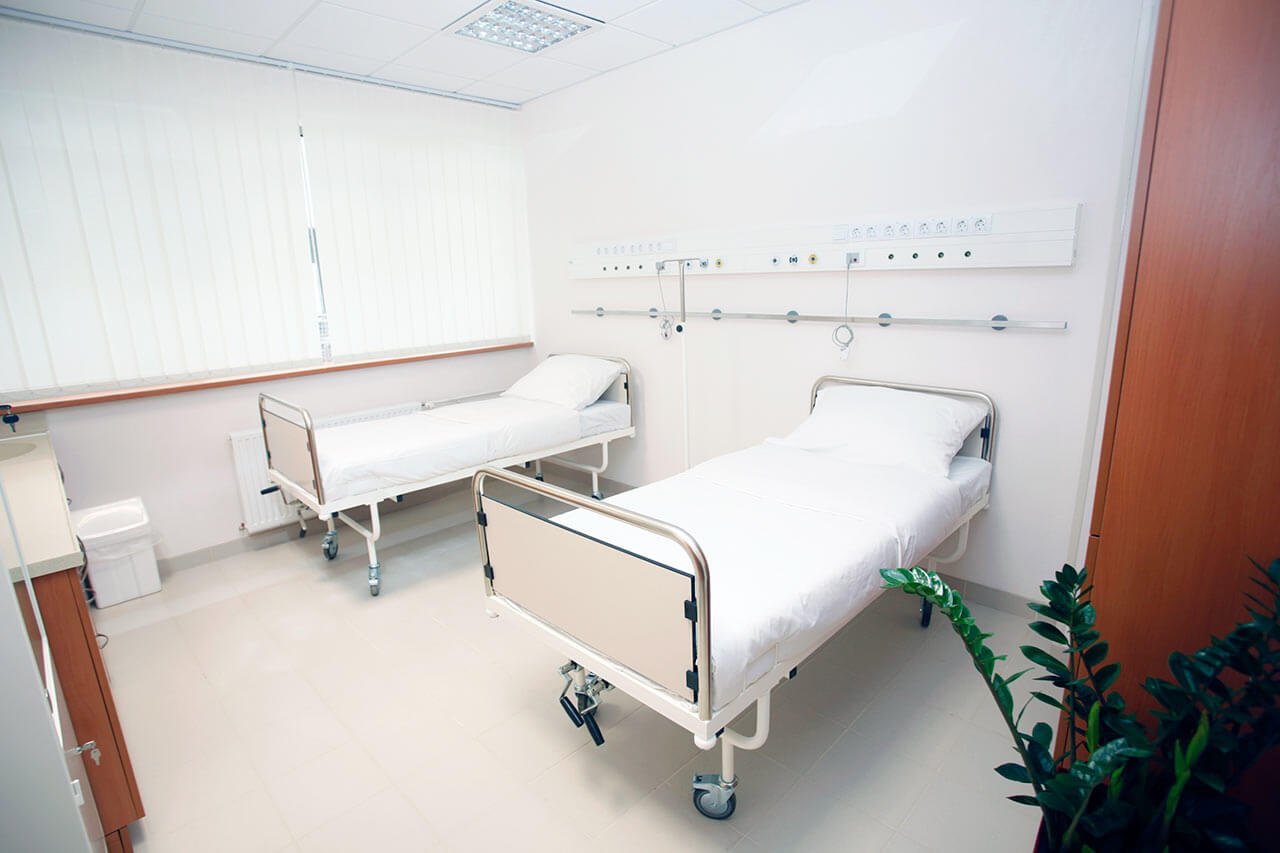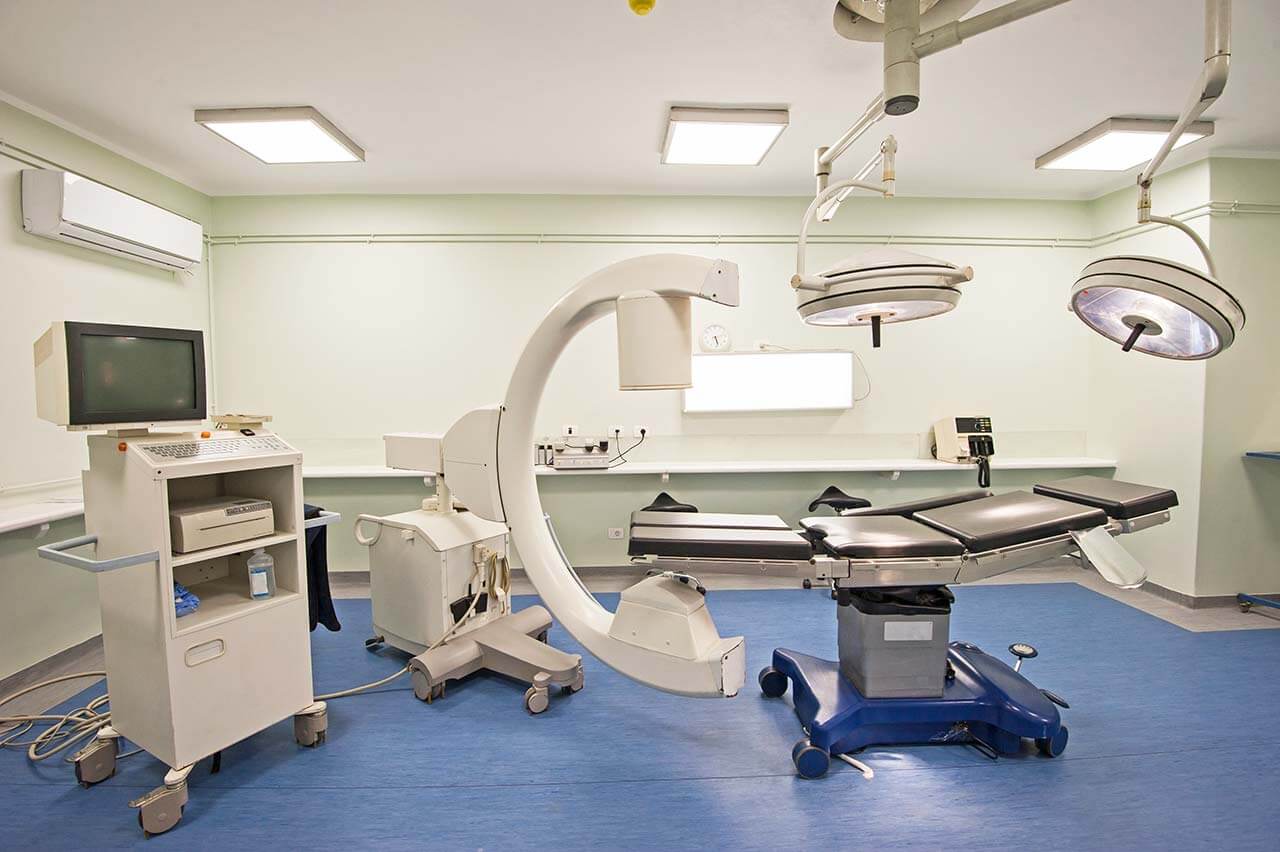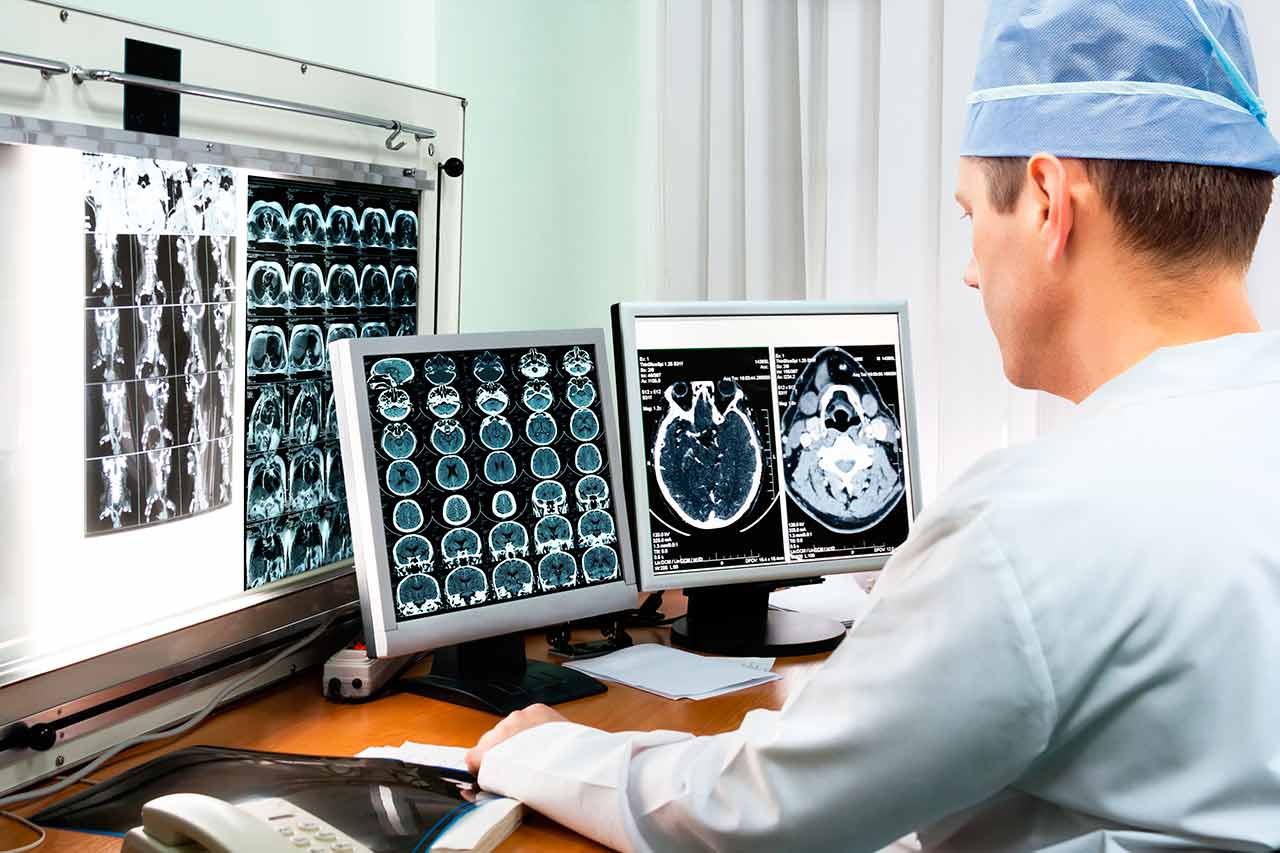
The program includes:
- Initial presentation in the clinic
- clinical history taking
- review of medical records
- physical examination
- laboratory tests:
- complete blood count
- general urine analysis
- biochemical analysis of blood
- inflammation indicators (CRP, ESR)
- indicators of blood coagulation
- tumor markers (CEA, CA19-9, CA125)
- gynecological examination
- ultrasound scan: pelvis, abdomen
- preoperative care
- da Vinci myomectomy
- symptomatic treatment
- control examinations
- the cost of essential medicines and materials
- nursing services
- full hospital accommodation
- explanation of future recommendations
How program is carried out
During the first visit, the physician will conduct a clinical examination and go through the results of the available diagnostic tests. After that, you will undergo the necessary additional examination, such as the assessment of liver and kidney function, ultrasound scan of the abdominal and pelvic organs, CT scan and MRI (if necessary). Based on the results of an additional examination, the physician will clarify the size and location of the myomatous nodes, choose the surgical technique and the type of anesthesia.
Surgery with the da Vinci robot starts with general anesthesia. After anesthesia, the surgeon makes small incisions through which he inserts the manipulators of the da Vinci robot and a video camera into the pelvic cavity. Using manipulators, the doctor removes myomatous nodes, and the video camera continuously transmits a three-dimensional image of the operating field in 12-fold magnification to the monitor.
Due to the precise movements of the da Vinci robotic arms, the surgeon can successfully remove multiple and large myomatous nodes on any wall of the uterus. After that, the wall of the uterus is sutured with a multilayer suture. This ensures the consistency of the scar on the uterus in the future and contributes to the preservation of the reproductive function.
Excessive body mass, which usually complicates endoscopic surgery, is also not a direct contraindication to robotic intervention.
After the completion of the operation, you will be transferred back to the ward, under the supervision of the attending physician and nursing staff. Due to the minimal invasiveness of the operation and the short duration of general anesthesia, you will not need to stay in the intensive care unit for a long time.
Finally, the attending physician will evaluate the results of control examinations, schedule the date of discharge from the hospital and give you detailed recommendations for further follow-up and treatment.
Required documents
- Medical records
- Ultrasound scan (if available)
Service
You may also book:
 BookingHealth Price from:
BookingHealth Price from:
About the department
According to the Focus magazine, the Department of Adult and Pediatric Gynecology, Obstetrics at the University Hospital Muenster ranks among the top German departments specializing in obstetrics!
The department offers the full range of diagnostics and treatment of all gynecologic diseases in women and girls. The specialization includes surgical gynecology and gynecologic oncology, obstetrics and perinatal medicine, gynecological endocrinology and reproductive medicine. All the very latest and most effective treatment methods are available here.The Chief Physician of the department is Prof. Dr. med. Ludwig Kiesel.
A special focus is made on the treatment of malignant tumors of the female reproductive organs, which is carried out within the Comprehensive Cancer Center Muenster. A highly qualified interdisciplinary medical team works for the benefit of the patients. The basis of its activities is the use of the very latest therapeutic options in combination with psychosocial care. The department is certified by the German Cancer Society. If the surgical removal of gynecological tumors is required, preference is given to minimally invasive techniques, which have several advantages compared with classical surgery, for example, a small incision (2-3 cm), minimal pain, low blood loss and early recovery of the patient. The most common diagnoses in the field of gynecological oncology are uterine cancer, cervical cancer, cancer of the external genitalia (vulvar cancer), vaginal cancer and cancer of the connective tissue of the reproductive organs (sarcoma).
Obviously, the service range of the department includes the diagnostics and treatment of common gynecologic disorders, for example, endometriosis, uterine myoma, polycystic ovary syndrome, hormonal disorders due to the gynecologic diseases, menstrual disorders, etc. Also, the department's specialists provide comprehensive care for young patients with such problems as premature sexual development or its delay, irregular periods in girls, and genital infections.
In the field of obstetrics and perinatal medicine, the department provides the comprehensive pregnancy management and ultrasound diagnostics in all trimesters of pregnancy, including the invasive diagnostics and therapy in the womb (amniocentesis, umbilical cord puncture, etc.). Natural childbirth is particularly important, however, the department offers all modern methods for complicated labor and anesthesia. The scope of tasks includes quality postpartum care both for mother and baby. At the same time, the key role is played by sensitive, friendly attitude, care and openness to all wishes and questions of a woman. If necessary, the patient is also provided with the help of breastfeeding specialists, pediatricians, psychosocial workers, physiotherapists, and nutritionists. If something threatens the life of a child during or after childbirth, the department's specialists immediately take all the necessary therapeutic measures in order to improve the baby's health.
The department also employs the specialists in the field of reproductive medicine (specialized center). They make every effort in order to give a woman the opportunity to have a child. The therapeutic options include in vitro fertilization, intracytoplasmic sperm injection, ovarian hormonal stimulation, in vitro fertilization with microinjection of spermatozoa into oocytes, TESE technique and other assisted reproductive techniques.
The service range of the department includes:
- Diagnostics and treatment of common gynecologic diseases in women and girls
- Adrenogenital syndrome
- Premature sexual development
- Endometriosis
- Myomas
- Polycystic ovary syndrome
- Menstrual cycle disorders (absence of menstruation, lack of ovulation)
- Premenstrual syndrome
- Vaginal bleeding of unknown origin
- Corpus luteum insufficiency
- Hyperprolactinemia
- Hormonal disorders
- Hair loss
- Hirsutism
- Contraception, postpartum contraception
- Menopause, climacteric syndrome
- Sexually transmitted diseases
- Diagnostics and treatment of cancer of the female reproductive system
- Early cancer detection, screening
- Uterine cancer
- Cervical cancer
- Ovarian cancer
- Vulvar cancer
- Vaginal cancer
- Vaginal connective tissue cancer (sarcoma)
- Obstetric services and perinatal medicine
- Comprehensive management of pregnancy, childbirth and postpartum care for both mother and child
- Perinatal diagnostics and therapy
- First trimester screening (12-14 weeks of pregnancy) with collarspace thickness measurement, detailed ultrasound examination of the child and additional maternal blood sampling in order to determine PAPP-A and free beta hCG
- Chorionic villus sampling
- Preeclampsia screening (12-14 weeks of pregnancy) in order to assess the risk of developing preeclampsia in the future
- Amniocentesis performed at the 16th week of pregnancy
- Ultrasound examination of baby’s organs between 20-22 weeks of pregnancy
- Umbilical cord puncture, intrauterine transfusion (injection of blood to the child through the umbilical cord) and other interventions for the treatment of child
- Genetic syndromes testing (for example, trisomy 13, 18 and 21) through maternal blood
- Diagnostics and treatment of urinary incontinence and pelvic prolapse
- Conservative methods
- Electrostimulation
- Biofeedback
- Pessary therapy
- Therapeutic gymnastics
- Drug therapy
- Surgical methods
- Interventions through vaginal access (for example, bladder, pelvic floor, perineal plastic surgery)
- Intervention through abdominal access (for example, Marshall-Marchetti-Krantz and Burch operations)
- Conservative methods
- Diagnostics and treatment of infertility in women
- Hormonal ovarian stimulation and ovulation induction
- Intrauterine insemination
- In vitro fertilization (IVF)
- Intracytoplasmic sperm injection (ICSI)
- Testicular sperm extraction (TESE)
- Other medical services
Curriculum vitae
Education and Professional Experience
- 1975 - 1978 Study of Medicine in Heidelberg.
- 1978 - 1979 Scholarship of the German Academic Scholarship Foundation, Royal Free Hospital Medical School, University of London.
- 1979 - 1981 Doctoral research work in the Department of Gynecology at the University Hospital Heidelberg.
- 1981 Approbation (medical license).
- 1981 - 1982 Research Fellowship of the German Research Foundation.
- 1982 American State Examination (ECFMG).
- 1983 - 1989 Internship in the Department of Gynecology at the University Hospital Heidelberg.
- 1989 Board certification in Gynecology and Obstetrics.
- 1990 Habilitation.
- 1992 - 2000 Senior Physician in the Department of Gynecology and Obstetrics, University Hospital Tuebingen (Head: Prof. Dr. med. H. A. Hirsch).
- 1996 Facultative medical training in Special Surgical Gynecology, Special Obstetrics, Gynecologic Endocrinology and Reproductive Medicine.
- 1996 - 2000 Managing Senior Physician and subsequently Chief Physician of the Department of Gynecology and Obstetrics, University Hospital Tuebingen (Head: Prof. Dr. D. Wallwiener)
- Since 2000 Head of the Department of Adult and Pediatric Gynecology, Obstetrics at the University Hospital Muenster.
Membership in Scientific Societies
- Member of the Ethics Committee of the Medical Association of Westphalia-Lippe.
- Chairman of the Foundation for Endometriosis Research (SEF).
- Board Member of the World Endometriosis Society (WES).
- Board Member of the German Menopause Society.
- Ex-President of the German Menopause Society.
- Board Member of the Umbrella Association of Reproductive Medicine (DVR).
- 1st Chairman of the Tumor Center Muensterland.
- Board Member of the German Society of Gynecologic Endocrinology and Reproductive Health.
- Chairman of the German-Hungarian Society for Gynecology and Obstetrics (DUGGG).
- Member of the Guidelines Commission of the German Society for Gynecology and Obstetrics (DGGG).
- Member of the International Menopause Society.
- Member of the European Endometriosis League.
- Representative of the German Society for Gynecology and Obstetrics in the Association of the Scientific Medical Societies (AWMF).
- Member of the European Menopause / Andropause Society (EMAS).
- Editorial Board Member, Associate Editor of "Breast Care".
- Editorial Board Member of "Journal of Endometriosis".
Awards
- 1981 European Research Prize of the Japanese Medical Society.
- 1986 Schoeller Junkmann Award of the German Society of Endocrinology.
- 1991 Julius Redel Prize of the Heidelberg University.
- 1991 Endometriosis Research Award of the Foundation for Endometriosis Research (SEF).
- 1992 Poster Award of the German Society of Gynecology and Obstetrics.
- 2010 Semmelweis Medal of the Hungarian Society of Gynecology and Obstetrics.
Photo of the doctor: (c) Universitätsklinikum Münster
About hospital
According to the Focus magazine, the University Hospital Muenster ranks among the top German hospitals!
The hospital belongs to the most prestigious medical institutions in Germany. The hospital is distinguished by a high professionalism of its doctors, state-of-the-art technological equipment and the availability of the most advanced diagnostic and therapeutic capabilities ensuring the first-class medical services. The hospital integrates more than 30 specialized departments, as well as numerous institutes and centers, thus representing all the specialties of modern medicine. The hospital treats more than 64,000 inpatients and 500,000 outpatients every year, which is an indisputable evidence of the highest quality of medical services.
The medical team of the hospital, consisting of more than 10,000 employers, is committed to preserving the physical health of patients, providing them with psychological support and compassionate attitude throughout the entire therapeutic process.
The hospital has succeeded in all specialties of medicine, however, main areas of its specialization include oncology, treatment of cardiovascular, neurological diseases, transplant medicine, psychiatry and psychosomatics, pediatrics with a special focus on rare diseases in children, traumatology, orthopedics, prenatal medicine, and reproductive medicine. In addition, key importance is given to scientific research and training of medical students, so that the specialists of the hospital make a momentous contribution to the development of medicine as a whole.
Photo: (с) depositphotos
Accommodation in hospital
Patients rooms
The patients of the University Hospital Muenster live in single or double rooms. The rooms are made in bright colors and modern design. Each room has an ensuite bathroom with shower and toilet. The standard room includes an automatically adjustable bed, a bedside table, a table and chairs for receiving visitors, a telephone and a TV. The hospital offers access to the Internet. If desired, the patient can also stay in the enhanced-comfort room.
Meals and Menus
The patients of the hospital are offered a tasty and balanced three meals a day: breakfast, lunch and dinner. The menu always features diet and vegetarian dishes. If for any reason you do not eat all the food, you will be provided with an individual menu. Please inform the medical staff about your dietary preferences prior to the treatment.
Further details
Standard rooms include:
Religion
Religious services are available upon request.
Accompanying person
During the inpatient program, an accompanying person may stay with you in a room or at the hotel of your choice.
Hotel
During the outpatient program, you can live at a hotel of your choice. Managers will help you to choose the most suitable options.
The hospital offers a full range of laboratory tests (general, hormonal, tests for infections, antibodies, tumor markers, etc.), genetic tests, various modifications of ultrasound scans, CT scans, MRI and PET / CT, angiography, myelography, biopsy and other examinations. Treatment with medications, endoscopic and robotic operations, stereotaxic interventions is carried out here, modern types of radiation therapy are also used. The hospital offers patients all the necessary therapeutic techniques.
- Stereotactic radiotherapy, including intracranial one
- Thulium and holmium laser enucleation of the prostate
- HIPEC for peritoneal cancer
- Imlantation of mechanical heart support systems
- Assisted reproductive technologies
These are arthrosis and sports injuries of the joints, benign neoplasms and malignant tumors of various localizations, spinal injuries, osteoporosis, benign prostatic hyperplasia, urolithiasis, inflammatory bowel disease and other pathologies.
- Traumatology and hand surgery
- Urology
- General and abdominal surgery
- Cardiology and cardiac surgery
- Obstetrics and gynecology
The hospital's team consists of more than 10,000 highly qualified employees.






